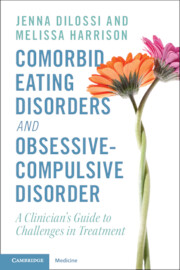 Comorbid Eating Disorders and Obsessive-Compulsive Disorder
Comorbid Eating Disorders and Obsessive-Compulsive Disorder from Part III - Evidence-Informed Considerations for Assessment and Treatment
Published online by Cambridge University Press: 14 December 2023
Self-monitoring is a core component of cognitive behavioral therapy (CBT) and is often used in the treatment of eating disorders (EDs) and obsessive-compulsive disorder (OCD). It enables individuals to observe their behaviors and thought patterns, identify triggers and areas of strength, and make changes to improve their mental and physical health. For individuals with co-occurring OCD and EDs, self-monitoring can be especially useful in discerning between their thoughts and those influenced by their pathology. However, there is a risk that self-monitoring can become compulsive and part of the OCD. In people with OCD, the process of information gathering can fuel the disorder and lead to prolonged distress, rigidity, and a lack of mindfulness. To address this, a therapist may suggest modifying the self-monitoring protocol or incorporating OCD-specific treatment such as exposure and response prevention (ERP) into the treatment plan. It’s important for individuals to seek professional help and support to address their co-occurring OCD and ED. Clinicians treating EDs should be aware of the signs that OCD may be impacting the self-monitoring process and take steps to address it.
To save this book to your Kindle, first ensure [email protected] is added to your Approved Personal Document E-mail List under your Personal Document Settings on the Manage Your Content and Devices page of your Amazon account. Then enter the ‘name’ part of your Kindle email address below. Find out more about saving to your Kindle.
Note you can select to save to either the @free.kindle.com or @kindle.com variations. ‘@free.kindle.com’ emails are free but can only be saved to your device when it is connected to wi-fi. ‘@kindle.com’ emails can be delivered even when you are not connected to wi-fi, but note that service fees apply.
Find out more about the Kindle Personal Document Service.
To save content items to your account, please confirm that you agree to abide by our usage policies. If this is the first time you use this feature, you will be asked to authorise Cambridge Core to connect with your account. Find out more about saving content to Dropbox.
To save content items to your account, please confirm that you agree to abide by our usage policies. If this is the first time you use this feature, you will be asked to authorise Cambridge Core to connect with your account. Find out more about saving content to Google Drive.